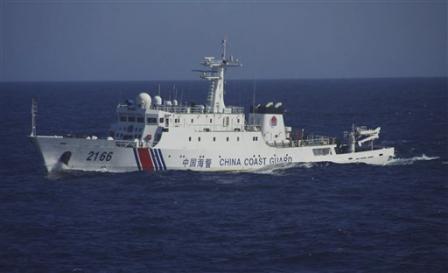China's Coast Guard - Smooth Sailing or Rough Seas for its Neighbors?
The establishment of the China Coast Guard (CCG) in 2013 created a huge stir. Neighbouring countries may see the CCG as a major instrument for China to reconfigure maritime power structure in the region.

China's Coast Guard
The CCG was established under the State Oceanic Administration (SOA), from the merger of several formerly disparate agencies: the Maritime Police — the nucleus of the CCG, the Fisheries Law Enforcement Command, the General Administration of Customs, and China’s Maritime Surveillance. These represent four of the five agencies that enforce China’s maritime laws and regulations. Only the Maritime Safety Administration remains independent from this newly created maritime law enforcement authority. This integration facilitates greater resource pooling, promotes uniformity in action and assigns accountability.
China was a latecomer in developing a unified coast guard. In a 2007 report by Ningbo Academy, it was stressed that China’s ‘maritime law enforcement forces … are not commensurate with [its] status and image as a great power’. A 2010 paper from the US Naval War College also pointed out that China was in a position of ‘relative weakness in a strong neighbourhood’. China’s neighbours were well ahead in developing their respective coast guards — Japan since 1948, South Korea since 1953 and Taiwan in 2000. Surely, unresolved disputes may have contributed to the realisation of the project or to speeding up the process, but given the country’s bustling maritime economy, the establishment of the CCG was inevitable.
Placing the CCG under the SOA, instead of the Ministry of Public Security, suggests not only the CCG’s civilian and desecuritised character, but also its possible use for strategic peacetime activities. The SOA is in charge not only of maritime law enforcement, but also of maritime policy, ocean economic development, marine environmental protection, international maritime cooperation, resource exploration, and polar scientific expedition. The SOA also engages in marine scientific surveys and research, which may involve foreign partners. This allows the SOA to facilitate exploratory cooperation with the marine scientific community of East Asian coastal states, including claimants in the East China Sea and South China Sea disputes. But at the same time, placing the CCG under the SOA may also signal greater resolve on Beijing’s part to administer disputed islands and waters. The SOA’s mandates also include the management of islands.
Given the tense atmosphere in the region, the development of the CCG should proceed with reassurances to allay fears that China may use this new body to the detriment of its neighbours. It is the inherent right of every sovereign country to develop institutions to protect and promote its legitimate national maritime interests. But it also has a duty to ensure that in such a pursuit, peace and amity with its neighbours will not be compromised. This is especially so if what it considers as its indisputable maritime domain has long been considered as the traditional of other parties.
In the context of China’s continuing efforts to build structures in the South China Sea and challenge Japan’s administration of the Diaoyu/Senkaku islands, the CCG may be seen as a means for China to reconfigure the maritime power structure in the region. Integrating national objectives into one body may enable China to gradually change the status quo. The CCG could embolden Chinese fishing vessels to venture out farther into the East and South China Seas to fish in waters already considered as territories or maritime zones of other countries. Farther CCG patrols may also increase the likelihood of contact with maritime law enforcement agencies of neighbouring states. This increases the risk of friction in the region, particularly if appropriate mechanisms are not in place.
The establishment of CCG should not forestall China’s efforts to continue exploring ways to engage its neighbours to address common threats and challenges in their shared maritime domain.
Is China’s Coast Guard troubling the waters? is republished with permission from East Asia Forum


























No comments:
Post a Comment